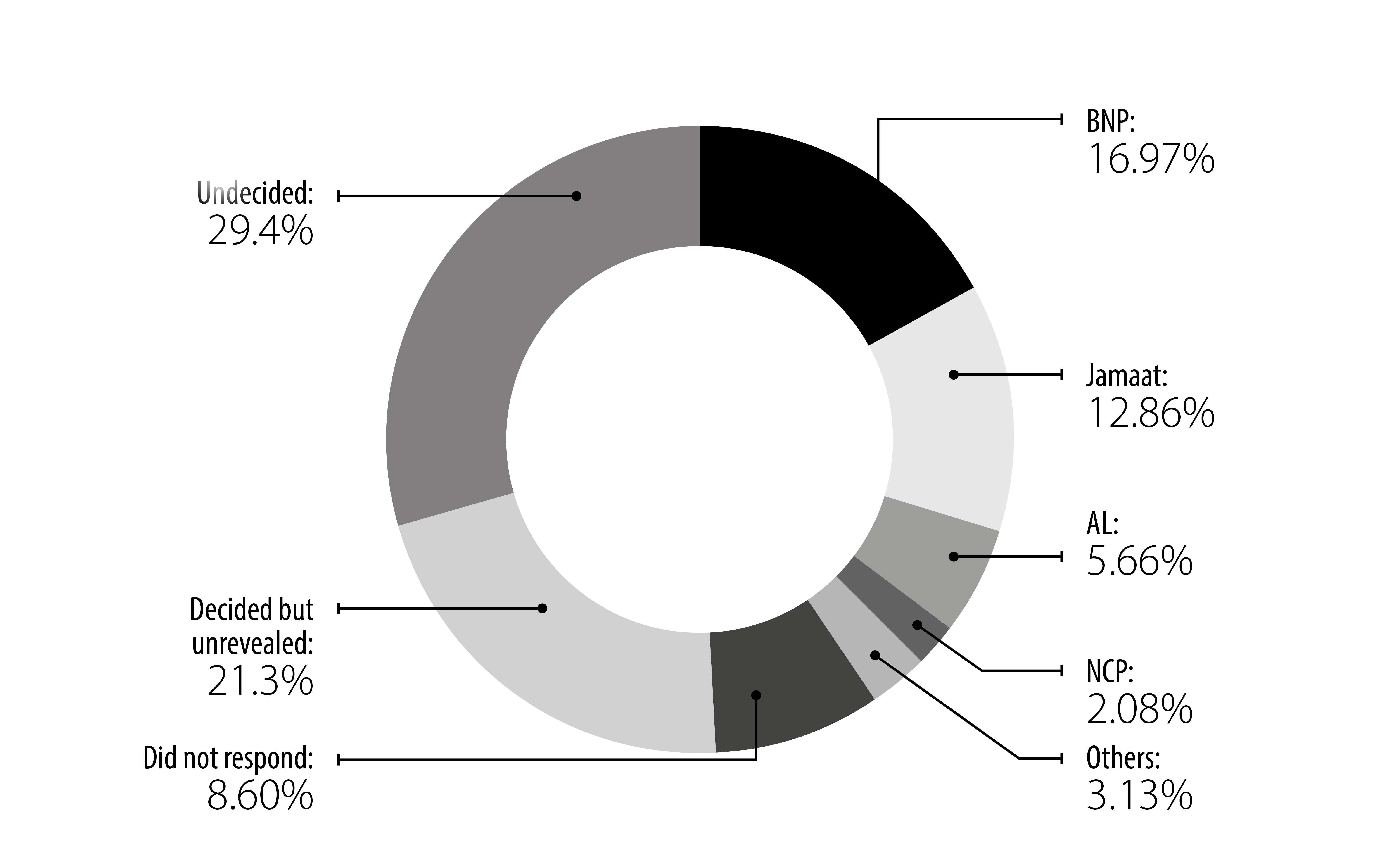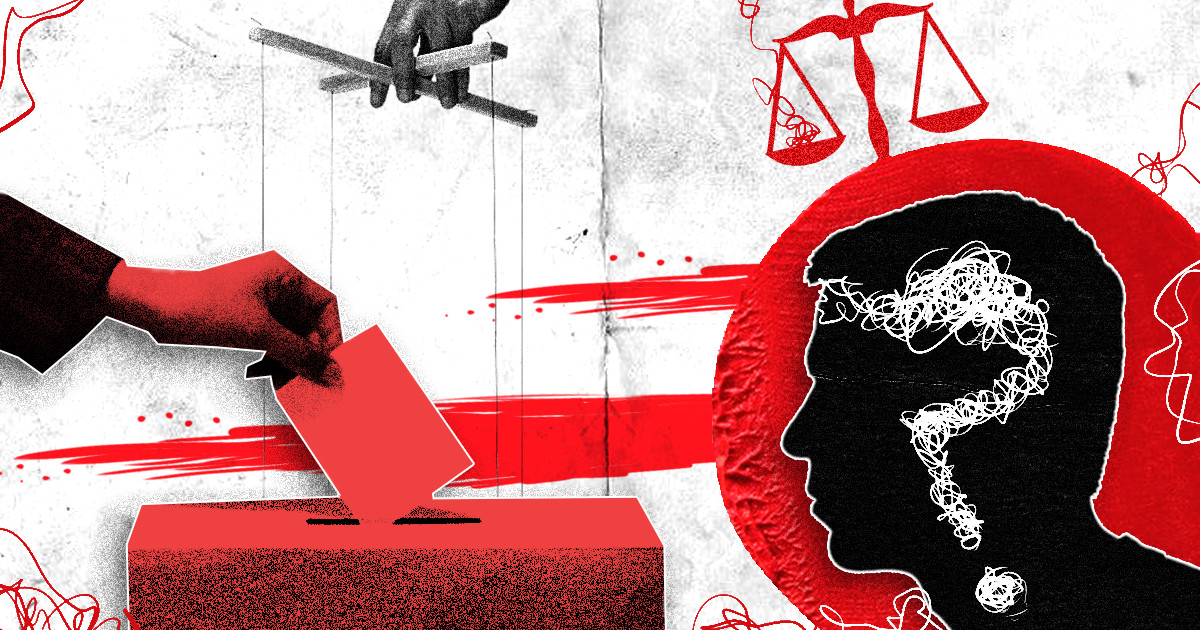What can our political parties learn from the opinion polls?

In Innovision's nationwide poll completed in March 2025, of the 10,696 people surveyed, 29.6 percent said they had not decided whom they would vote for. In contrast, BRAC Institute of Governance and Development's (BIGD) August 2025 survey found that 48.5 percent of their 5,495 respondents were undecided about their voting preference. Post-uprising, we thought that our nation would be uniting under a common hope: a reformed Bangladesh. Our polls are showing that voters are losing that hope. They also appear to be confused about whom they will vote for. The question is why?
BIGD did not ask a follow-up question to determine the underlying reasons for voters' indecision, but Innovision's March 2025 poll did. First, we found that a higher percentage of urban voters are undecided (urban 35 percent, rural 27 percent). Second, a higher proportion of Gen Z and Millennial voters are undecided when compared to other generations (Gen Z 33.64 percent, Millennials 28.06 percent, Gen X 25.53 percent, Boomers II 25.99 percent, Boomers I 26.00 percent, Post War 21.25 percent). Also note, 52 percent of Hindu voters, as opposed to 37 percent of Muslim voters, were undecided in the March 2025 poll. We also found that residents of pucca households were more undecided (45 percent), as opposed to those living in jhupri (37 percent). This means that the relatively wealthier families were more undecided. Besides, 52 percent of the ethnic voters were undecided, in contrast to 38 percent of Bangalee voters. The share of undecided voters was higher among students, petty traders, and homemakers.
When asked, 49.3 percent of the undecided voters cited not knowing who the candidate would be as a reason for their indecision. Meanwhile, 33.9 percent of them said they would make decisions based on the political situation before the election. Also, 14.5 percent of them were not thinking of the election and 9.7 percent of the undecided voters did not trust mainstream political parties. To understand whether doubt about Awami League's election participation impacted the voters' decision not to vote, we had a proxy, and it was revealed that 6.1 percent were undecided because they were unsure whether their preferred party would participate in the election. Of the rest, 3.7 percent said they do not see any alternative political parties and 6.5 percent refused to comment. Note that 10.3 percent of the Gen Z voters said they do not trust mainstream political parties, in contrast to only 3.95 percent of Gen X voters. Besides, 4.2 percent of Gen Z said they are undecided because they do not see any alternative political parties. Also, a higher percentage of urban undecided voters (12.1 percent) compared to rural voters (5.3 percent) mistrust mainstream political parties.
The results of the Innovision survey show that our voters want to know who their candidates are. The political parties have so far failed to disclose their preferred candidates. Jamaat has already put forward a list of candidates, unofficially. But BNP has kept us in the dark in this matter, while the NCP is still organising itself. In this election, voters are asking for candidates who will work for them, on their behalf. The parties must engage with the voters and talk to them before finalising their candidates. Just using the party's name will not be enough to win this election. We also asked the respondents how they decide whom to vote for, and 21.6 percent responded that they always vote for the same party, 8.6 percent said they vote for a different party every election. However, 38.1 percent of the respondents said they make the decision based on the performance of the previous candidate. This means voters will be assessing the historical background of nominated candidates to assess their credibility. So, new candidates must break through the baggage left behind by their predecessors.
The data is clear. If the next election is free and fair, then the parties must now race to win the voters' hearts. That heart, however, has hardened, and it is bruised. If the parties think their old tactics would work, they would be wrong. So, how do the parties gain voters' trust ahead of the election?
The solution depends on both political parties' higher-ups and local leaders, or the aspiring nominees. During a recent field visit near the Sundarbans, I saw men in their mid-50s and 60s congregating at a local tea stall at 5:30pm. The tea stall owner switched on Somoy TV channel on YouTube. I was surprised to see how these common people from one of the remotest areas in the country were gathering information online through a private TV channel. I was also startled to see how all the news headlines sounded like BNP is creating chaos by not agreeing with several reform proposals. BNP will be in a fool's paradise if they think they can easily win the next election with a landslide given the concerns about its grassroots activities among many people. The same theory applies to NCP as well. These parties must conduct a critical self-reflection. People want to move ahead from the old political culture of violence and control. Jamaat is benefiting from the chaos that BNP and NCP are in, and seems better organised, but it is still not above self-reflection given the changing demands of the time.
We, the people of Bangladesh, want a free and fair election. We want a parliament where there is a balance in power between the opposition and the government. We want the opposition and the government to work as a group for the common interest of Bangladesh. We do not want an opposition that will resort to street violence from day one, after the election, and declare that they will not cooperate with the government. Such an opposition party, in my opinion, is no less fascist than the ruling party we saw before. We want a government that listens to the opposition. We want a government that takes the opposition and the civil society as partners in building the nation. A ruling party that suppresses the opposition's voice in the parliament and remains in denial mode is something the people of Bangladesh have already ousted.
I request all political parties to listen to the people. The opinion polls are giving you insights that you otherwise failed to gather through your own apparatus. This is the gift from the people of Bangladesh to you. Make good use of them.
Md Rubaiyath Sarwar is managing director of Innovision Consulting.
Views expressed in this article are the author's own.
Follow The Daily Star Opinion on Facebook for the latest opinions, commentaries and analyses by experts and professionals. To contribute your article or letter to The Daily Star Opinion, see our guidelines for submission.



 For all latest news, follow The Daily Star's Google News channel.
For all latest news, follow The Daily Star's Google News channel. 

Comments